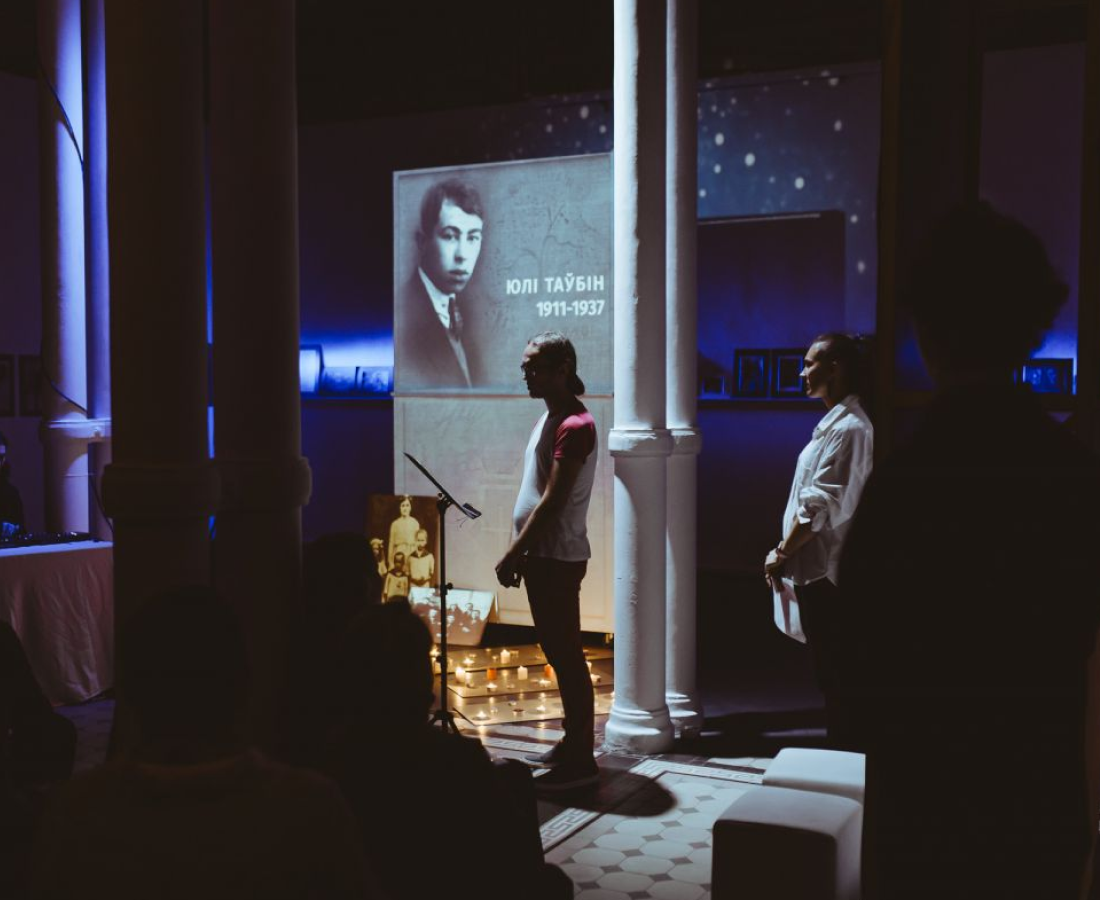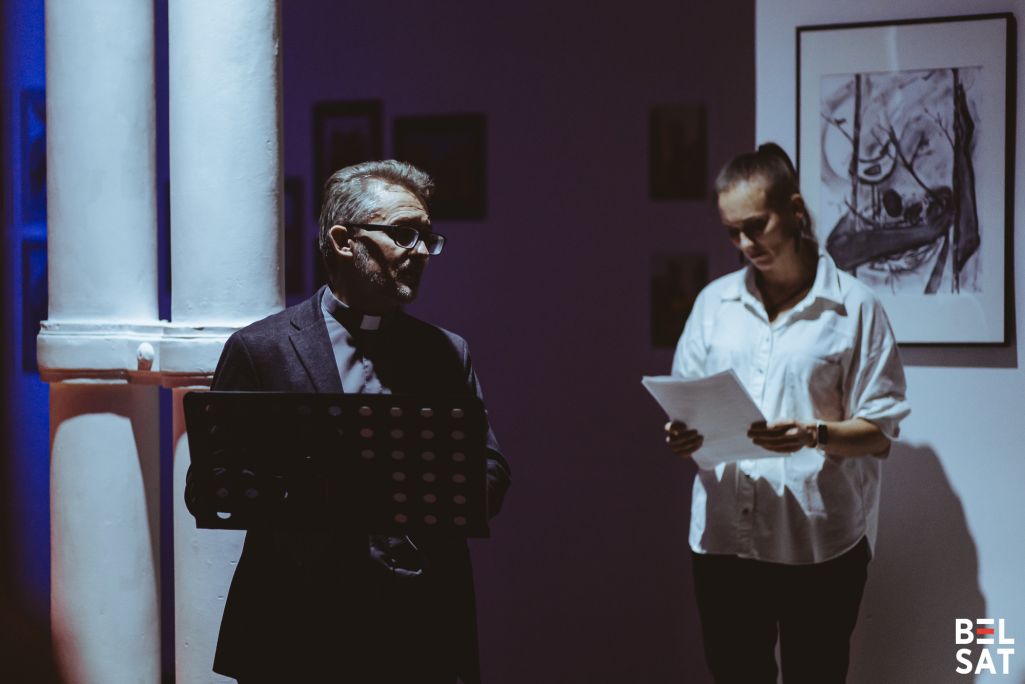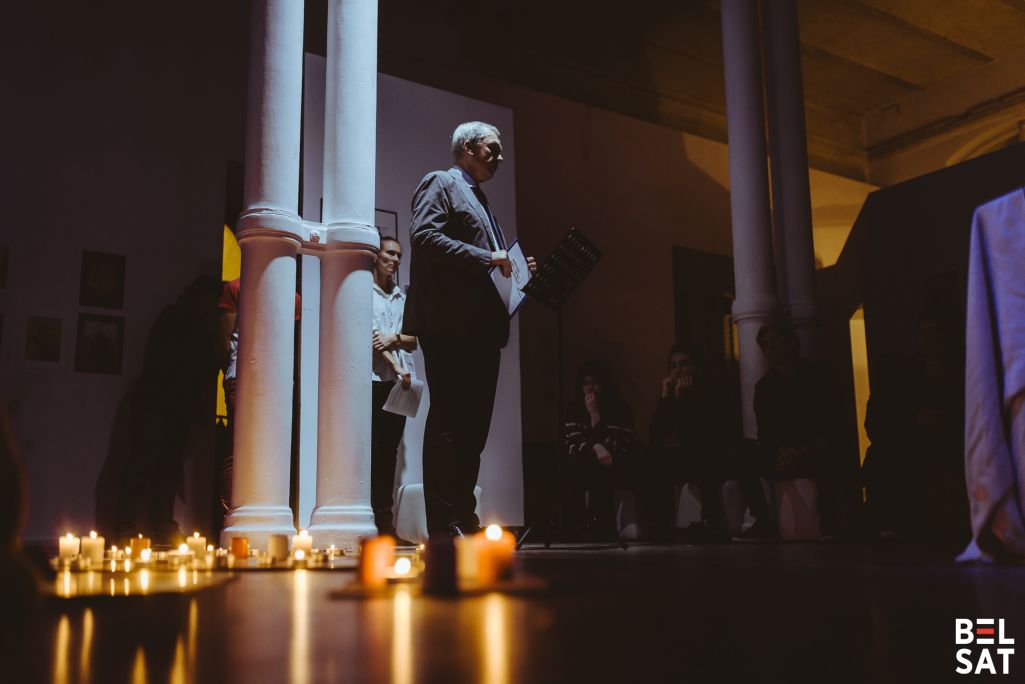
On the evening of October 29, “Belsat” attended the “Night of Poets” at the Museum of Free Belarus in Warsaw. Candles, subdued music, minimal pomp. And the poems of those whose lives and creative dreams were cut short by Stalin’s executioners on the night of October 30, 87 years ago. Perhaps this — in a nearly intimate, slightly mystical atmosphere — is exactly how one should remember the tortured and executed: then they return. Like coming home…
“Tonight there will be no divisions — no dividing those who listen and those who perform, between poets and their admirers, between the living and the dead… Tonight we are all together,” said one of the hosts at the very beginning of the event, actress and co-founder of the theatrical initiative “Deja Druga,” Volha Karalionak.
People simply stepped forward and read poems. And the dead became alive: Mikhas Charot, Yuli Taubin, Anatol Volny, Ales Dudar, Moyshe Kulbak, Valery Marakou, Fyodar Klyashtorny, and many others.
Father Vyachaslaw Barok read the poem “Never” by Belarusian priest Alexander Astromovich, who wrote under the pseudonym Andrey Zyazyulya. The poet and priest had passed away long before 1937 — in 1921. “So why do I dare to speak about his work and his name? Because the Night of the Executed Poets in Belarusian society began long before October 29, 1937. And, unfortunately, this night still continues,” said Vyachaslaw Barok.
This dark night endures because there are always people in Belarusian society who live by the noble teaching of poet Andrey Zyazyulya, Barok explains. The teaching goes:
“Let the storm rage, let the whirlwind rage,
Let the wind howl gloomily over the river,
I will never betray my native land, which strives for freedom…”
“Let this poem inspire us. Belarusians today lack loyalty to this idea — that Belarus comes first. Today we remember the names of those who, out of love for their homeland and for Belarusianness, gave their lives. Let this truth enlighten and uplift us! So that we remain faithful to this oath and never betray our native Belarus,” the priest urged.

The oath of Andrej Ziazulia is amplified by the “Oath” (1937) of Michaś Čarot. Piercing lines from this poem were read by Sjaržuk Hierasimovič, a representative of the Belarusian Language Society: “I swear to you, friends, My fields, My forests — I tell you — I am not guilty!”
The poetic words were deepened by music, improvised in sync with the verses by composer Illya Semaškevič. “The hardest part was not to overshadow the text, but to enhance and emphasize the emotions of the poems, which were very diverse,” Semaškevič admitted after the evening ended.
During the performance, it felt as if Semaškevič’s sound followed not only the text but also the play of light and shadow — at the deepest musical moments, the candle flames began to tremble.
“Looking at these candles, it comes to mind that a human life is like a candle. It burns out — a person passes into another world. Or someone may extinguish that candle. In the 1930s, it was those monsters who would just come and put out the candles — killing the elite of our nation, our people,” said Pavel Latushka, Deputy Head of the United Transitional Cabinet and leader of the NAU, stepping onto the improvised stage to read Anatol Volny’s poem “The Insurgents.”
Latushka recalled how in 2012, traveling by train to Vienna, he wept after finishing the script by Alena Kaliunova for the film Kupala, because it ended with a martyrology — “the surnames and names of executed — no, not executed! — Belarusian poets.” He recounted how the Lukashenka administration later categorically refused the proposal to make the film. Nevertheless, the film was completed, with a premiere planned for 2020, though the regime was genuinely scared. The film is “about the struggle against the Russian invasion, against the invasion of Stalinism.”
“This is my own understanding of this burning candle, and of a life that burns. But it will not burn out, because behind each candle, others will appear — we will light them and keep lighting them! And I believe that they will illuminate our path to freedom. I believe Belarus will be free. Our poets are never executed! They are here with us today, in our hearts and souls,” said Pavel Latushka.
The politician also commemorated victims of the Lukashenka regime — Raman Bandarenka, Ales Pushkin, Mikalaï Klimovich, and others — and urged fighting for the freedom of cultural figures who remain imprisoned in Belarus today — more than 200 people.

Volha Karalionak reads Valery Marakov’s poem “Oh, the stone fell silent, the stone is silent…” and then shares her own reflection: we should try to treat our enemies like stones — simply remove them from our path and from our fields when it’s time to sow.
“We do not spare our calluses. We dig up curses for others,
But without bargaining and without words
We give up our heroes…”
These lines from Ales Dudar’s poem “They Burned Our Land…” are delivered with poignant feeling by journalist Zmitser Lupach.
“While we argue here among ourselves — ‘I won’t go there because so-and-so will be there’ — the fate of Belarus, as in 1921, in 1939, and after the Second World War, may once again be decided without us. Once again, our land may be cut down,” warns Zmitser Lupach.
Another poem by Ales Dudar is performed by former political prisoner and participant in the theatrical initiative “Deia Druhaia”, Danila Hancharov (who also contributed to the warm and tasteful design of the event). He reads “I Am Young”: “This blood fears not death, this heart will melt the ice, the flight of birds will not outrun these boiling thoughts of death…”
From his seat rises another former political prisoner, Zmitser H. He recounts that while in the colony, he read an article in Dzejaslou about poet Zmitser Vitalin, arrested back in 1933, who survived and lived until 2004. Not executed, yet his fate resonates with the destinies of all Belarusian creators, all Belarusians. Zmitser then reads the poem “To Avenge”.
The evening of remembrance concludes with lines by Anatol Sys: “Release me, Kurapaty, even with a bullet in my head, to the children, to my wife, to my home. How does the fatherland live there?..”
In the final moments, the names of those not yet spoken aloud are read. Candles flare. Light grows. As if, truly, all the dead have come alive.
On the night of October 29–30, 1937, more than 100 Belarusian state officials, cultural figures, and scholars were executed in Minsk. Among them were 22 literary figures — poets, prose writers, translators, critics. This year, Belarusian communities held Night of Executed Poets memorials in many cities worldwide — from New York to Kyiv. In Warsaw alone, four events took place almost simultaneously across different venues, honoring the victims of the Stalinist and Lukashenka regimes.
Original article: belsat.eu